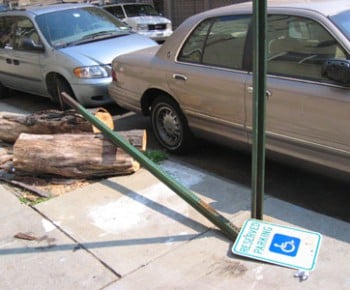
The human rights laws of New York and New York City may provide greater legal protections to people with disabilities than federal law. For example, the state law definition of “disabled” is not as strict as the federal definition, potentially providing protections to a broader group of people. New York also uses the wider “van accessible” size requirements for all accessible parking spaces.
Who do I contact if my accessible parking rights are infringed in New York state?
If your landlord or employer isn’t providing enough accessible parking, we encourage to use the forms on our Resources page to request that they add more. This is usually the first step in straightening out any accessible parking problem.
You can make complaints under the Fair Housing Act, the Americans with Disabilities Act, and New York State’s equivalent laws through the NYS Division of Human Rights. You must download and fill out the complaint form, have it signed and notarized, and submit it to the nearest regional office.
If you live in New York City, or if the cause of your complaint occurred in New York City, you can choose to file with the NYC Commission on Human Rights instead (note: you cannot file with both the state and city agencies). Complaints at the NYC Commission are made in person at their offices, and appointments can be scheduled by dialing 311. As is the case with most state agencies, complaints will be filed under state law and, if applicable, federal law as well.
Complaints must be filed within a year of the incident. An investigator will contact you once you have filed, and will attempt to resolve the situation before choosing to file an official complaint. When this official complaint is filed, it will also be served on your housing provider, and you will be offered a chance to enter mediation. The investigation will continue if no voluntary settlement is reached, and if the investigator finds “probable cause,” an attorney will be assigned to prosecute your case in administrative court. The administrative judge will usually hold a pre-trial conference to help the parties reach a settlement. If there is no settlement, the judge will conduct a hearing and issue a recommendation to the commission, which then issues the Final Decision and Order.
Though you do not need to hire your own attorney to file a complaint, you can choose to bring your own attorney to an administrative hearing. There are legal resources available in New York that may be able to provide you with advice or representation like Legal Aid, the LawNY Fair Housing Enforcement Project (1-866-671-FAIR), and the NYC Tenants Rights Hotline (212-979-0611). A more complete list of resources may be found by searching under New York at this site.
The information contained in these pages is for informational purposes only, and it’s no substitute for legal counsel.
